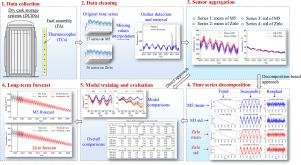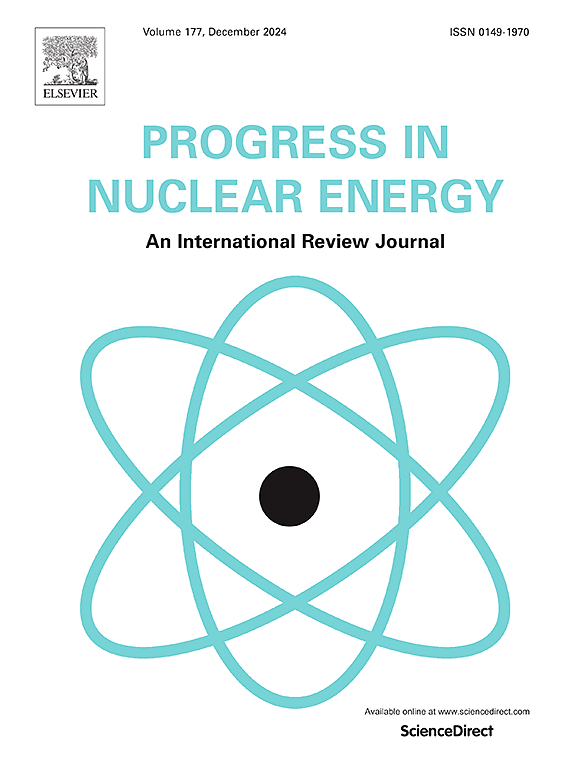Temperature forecast for spent nuclear fuels (SNFs) in dry storage using time series decomposition and machine learning
IF 3.2
3区 工程技术
Q1 NUCLEAR SCIENCE & TECHNOLOGY
引用次数: 0
Abstract
The spent nuclear fuel (SNF) is a high-level radioactive nuclear waste disposed from the nuclear power plants. Currently, SNF is stored in dry cask storage systems (DCSSs) for extended interim dry storage. The thermal profile of DCSSs during their dry storage has been identified as the top research priority. This study developed a temperature forecast framework for SNF in dry cask to predict their temperature variation over time. A framework was developed with six steps: data collection, data cleaning, sensor aggregation, time series decomposition, model training and evaluation, and long-term forecast with spatial temperature variability. The proposed framework was validated using real thermal data collected from M5 and Zirlo cladding materials. Research results found that the time series decomposition plays a key role by extracting the trend component from the original time series. Machine learning (ML) models trained on decomposed data achieve smaller errors compared to models trained on the original data. Among the four models evaluated, autoregressive integrated moving average (SARIMA) outperforms other models and has the best robustness across different training-testing split windows. Long-term temperature forecast demonstrates a gradual cooling trend and reduced temperature variability across fuel locations to the year of 2050. Conclusions and methodologies from this study are promising to support the decision-making for extended dry storage for high-level radioactive wastes.

使用时间序列分解和机器学习的乏核燃料干贮存温度预测
乏核燃料(SNF)是一种高放射性核废料,由核电站处理。目前,SNF储存在干桶储存系统(DCSSs)中,用于延长临时干储存。dscs在干贮存过程中的热分布已被确定为最重要的研究重点。本研究开发了干桶内SNF的温度预测框架,以预测其温度随时间的变化。该框架包括六个步骤:数据收集、数据清理、传感器聚合、时间序列分解、模型训练和评估以及考虑空间温度变化的长期预测。利用从M5和Zirlo包层材料中收集的真实热数据验证了所提出的框架。研究发现,从原始时间序列中提取趋势分量是时间序列分解的关键。与在原始数据上训练的模型相比,在分解数据上训练的机器学习(ML)模型的误差更小。在评估的四个模型中,自回归综合移动平均(SARIMA)优于其他模型,并且在不同的训练测试分割窗口上具有最佳的稳健性。长期温度预测表明,到2050年,各燃料地点的温度变化趋势将逐渐下降。本研究的结论和方法有希望为高放射性废物延长干贮存的决策提供支持。
本文章由计算机程序翻译,如有差异,请以英文原文为准。
求助全文
约1分钟内获得全文
求助全文
来源期刊

Progress in Nuclear Energy
工程技术-核科学技术
CiteScore
5.30
自引率
14.80%
发文量
331
审稿时长
3.5 months
期刊介绍:
Progress in Nuclear Energy is an international review journal covering all aspects of nuclear science and engineering. In keeping with the maturity of nuclear power, articles on safety, siting and environmental problems are encouraged, as are those associated with economics and fuel management. However, basic physics and engineering will remain an important aspect of the editorial policy. Articles published are either of a review nature or present new material in more depth. They are aimed at researchers and technically-oriented managers working in the nuclear energy field.
Please note the following:
1) PNE seeks high quality research papers which are medium to long in length. Short research papers should be submitted to the journal Annals in Nuclear Energy.
2) PNE reserves the right to reject papers which are based solely on routine application of computer codes used to produce reactor designs or explain existing reactor phenomena. Such papers, although worthy, are best left as laboratory reports whereas Progress in Nuclear Energy seeks papers of originality, which are archival in nature, in the fields of mathematical and experimental nuclear technology, including fission, fusion (blanket physics, radiation damage), safety, materials aspects, economics, etc.
3) Review papers, which may occasionally be invited, are particularly sought by the journal in these fields.
 求助内容:
求助内容: 应助结果提醒方式:
应助结果提醒方式:


